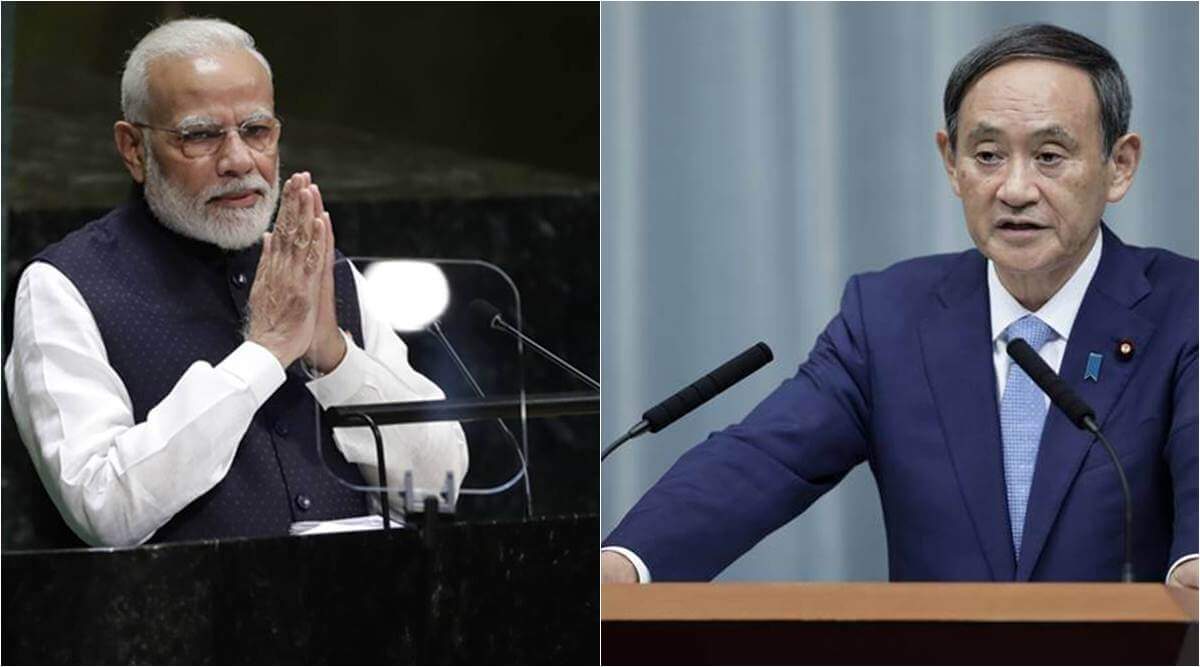On Friday, during a telephonic conversation between Indian Prime Minister Narendra Modi and his newly appointed Japanese counterpart Yoshihide Suga, the leaders agreed to boost bilateral cooperation between the two countries to “meet the challenges of the current regional and global situation” and to deepen their “all-round partnership.” This is the first conversation between the two since Suga’s appointment.
Had a very good conversation with PM Suga Yoshihide.
— Narendra Modi (@narendramodi) September 25, 2020
We exchanged views on the tremendous progress in our relationship in the last few years, and the future direction of our Special Strategic and Global Partnership. @sugawitter
We agreed that stronger India-Japan ties would help meet the challenges of the current regional and global situation.
— Narendra Modi (@narendramodi) September 25, 2020
I look forward to working with PM Suga to further strengthen our all-round partnership.
Soon after Friday’s conversation, official reports suggested that the two countries are also looking to bolster their collaboration for the development of 5G technology. For this, India and Japan will be seeking the help of Israel and Quad members the United States (US) and Australia.
Further, the Indian Navy reported on Sunday that the fourth edition of the three-day bilateral naval exercise between India and Japan, called JIMEX-20, was also underway. According to the statement, this exercise will “showcase a high degree of interoperability and joint operational skills through conduct of a multitude of advanced exercises, across the spectrum of maritime operations.”
Previously, India’s Prime Minister’s Office (PMO) had released a statement highlighting that the two leaders were working towards boosting their “Strategic and Global Partnership,” which was grounded on “mutual trust and shared values.” The statement said that they “emphasized that the economic architecture of a free, open and inclusive Indo-Pacific region must be premised on resilient supply chains, and in the context, welcomed cooperation between India, Japan, and other like-minded countries.”
This increased collaboration between India and Japan comes at a time where both countries have been stressing the importance of countering Chinese aggression in the Indo-Pacific region as they face “territorial threats” from China. India and China continue to struggle to successfully conclude diplomatic negotiations aimed at deescalating the ongoing border tensions along the Line of Actual Control (LAC) in Galwan. Japan and China are embroiled in their own ongoing territorial dispute over the Senkaku islands, with China constantly intruding on Japanese waters. Consequently, New Delhi and Tokyo have also been working towards forming alliances with like-minded countries in the region to “enhance stability and security across Asia,” and have increased their collaboration through the Association of South-East Asian Nations (ASEAN), East Asia Summit, and the Quadrilateral dialogue.
PM Narendra Modi also held his first bilateral summit with the recently re-elected Prime Minister of Sri Lanka, Mahinda Rajapaksa, on Saturday. During the summit, he stressed on India’s “Neighbourhood First” policy and how New Delhi intends to give “special priority” to improving its relations with Colombo. The two discussed enhancing cooperation between the two nations to “combat terrorism” in the Indo-Pacific region. Rajapaksa welcomed India’s $15 million assistance, dedicated to promoting the “Buddhist ties between the two countries.” He also applauded India’s assistance to douse the fire on the MT New Diamond ship, which he believed was a clear example of the successful cooperation between the countries. In July, India also announced a $400 million currency swap facility under the South Asian Association for Regional Cooperation (SAARC) to help Sri Lanka pay off its debts. Improving ties with neighbouring Sri Lanka and simultaneously countering Chinese influences on the island are not only crucial for India, but also for its allies, Japan, the US, and Australia, who are all looking to push back against China’s belligerence in the Indo-Pacific.
Consequently, on Monday, India also launched a cargo ferry service in collaboration with the Maldives in an effort to reduce the time taken and cost accrued to transport goods. This came a day after India announced a “soft loan” of $250 million to help the Maldives mitigate the challenges faced due to the COVID-19 pandemic.
It is indeed a happy day, President @ibusolih! Our dream of a direct ferry service between India and Maldives is now a reality. I have no doubt that it will promote bilateral trade and boost our economies. The Maldives-India friendship will continue to strengthen. 🇮🇳🇲🇻 https://t.co/jhduOUhaEk
— Narendra Modi (@narendramodi) September 27, 2020

